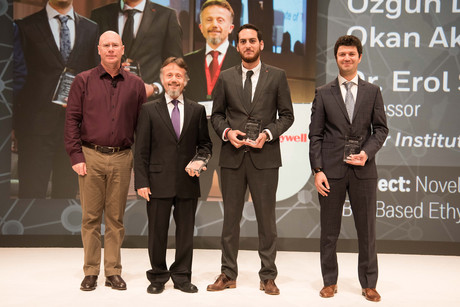Students use Honeywell software to simulate turning algae into ethylene

Two students from the Izmir Institute of Technology, who used Honeywell’s simulation software to demonstrate how to produce petrochemicals from algae, have been named the winners of Honeywell Process Solutions’ (HPS) annual UniSim Design Challenge. They defeated 60 teams from 25 countries. The Turkish chemical engineering students, who won the competition last year with a different project, were recognised during the company’s annual customer symposium held last week in San Antonio, Texas.
Ozgun Deliismail and Okan Akin, under the supervision of Associate Professor Dr Erol Seker, used UniSim Design and UniSim Dynamics to create a preliminary conceptual design and simulation of the production of bio-based ethylene from the marine microalgae of Nannochloropsis oculata. Ethylene produced from this renewable source can easily replace petrochemical-based ethylene in conventional production processes.
“The interest in renewable petrochemicals continues due to a combination of environmental concerns and economic uncertainties,” said John Roffel, director of Honeywell’s Simulation and Operator Competency product lines. “It is great to see that students around the world find new ways to tackle global challenges with the help of the UniSim Design Suite.”
The UniSim Design Challenge allows engineering students to propose solutions to real-world problems facing process manufacturers with Honeywell’s UniSim Design Suite software, which is used to design and model processes in production facilities around the world.
Deliismail and Akin presented the winning entry during the Honeywell Users Group (HUG) Americas Symposium, the company’s largest gathering of customers in the process manufacturing industries. Their preliminary design demonstrates the drastically reduced carbon footprint of the hybrid process by anaerobic digestion and oxidative coupling versus the traditional process of ethylene production. It also shows that bio-ethylene production from bio-methane is profitable.
“To our knowledge, this is the first reported simulation of bio-based ethylene production using the UniSim Design Suite,” said Dr Seker. “Its user-friendly interface, simplicity and great extensibility provide a great simulation environment to improve the design of the hybrid process.”
UniSim Design Suite provides an interactive process model that allows engineers to create steady-state and dynamic models and is used extensively for plant design, performance monitoring, troubleshooting, operational improvement, business planning and asset management around the world.
AVEVA collaborates with Microsoft on industrial AI assistant
AVEVA's industrial AI assistant, running on Microsoft Azure OpenAI Service, is designed to be...
Hexagon and Dragos announce technical partnership on OT cybersecurity
The technical partnership will focus on integrating the OT cybersecurity capabilities of the...
Claroty appoints Wavelink as sole distributor for entire Australian business
Wavelink has announced that cybersecurity solutions company Claroty has awarded Wavelink the sole...














